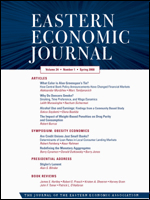
Lo más reciente
Our research delves into the impact of US macroeconomic and financial uncertainty shocks on global housing markets, employing a multi-country FAVAR model. This method empowers us to discern the repercussions of distinct uncertainty sources on the worldwide economy by introducing inherent contemporaneous constraints into the data generation process—an approach not feasible when confined to a single-country perspective. Our analysis unveils that financial uncertainty triggers an immediate, adverse influence on most of the Real Estate Investment Trust (REIT) markets across the globe, with this negative effect persisting for a span ranging from one to three quarters. In contrast, the impact of macroeconomic uncertainty exhibits a spectrum of responses. Numerous nations do not undergo a detrimental effect on their respective REIT markets. In certain instances, there is even a favorable reaction observed approximately 1 year later. This positive response suggests that housing markets beyond US borders may derive advantages from heightened US uncertainty, potentially attributed to the diverse investment opportunities they present during periods of economic upheaval in the USA. Furthermore, our findings indicate that the response of credit markets to uncertainty shocks mirrors the behavior of REIT returns, albeit to a lesser degree. This discovery implies that, while housing markets and credit are intertwined through crucial feedback mechanisms, housing markets also manifest a direct response to developments in financial uncertainty, likely via the expectations channel.
 José Eduardo Gómez-Gonzáleze,
José Eduardo Gómez-Gonzáleze,  Sebastián Sanín-Restrepoa,
Sebastián Sanín-Restrepoa,